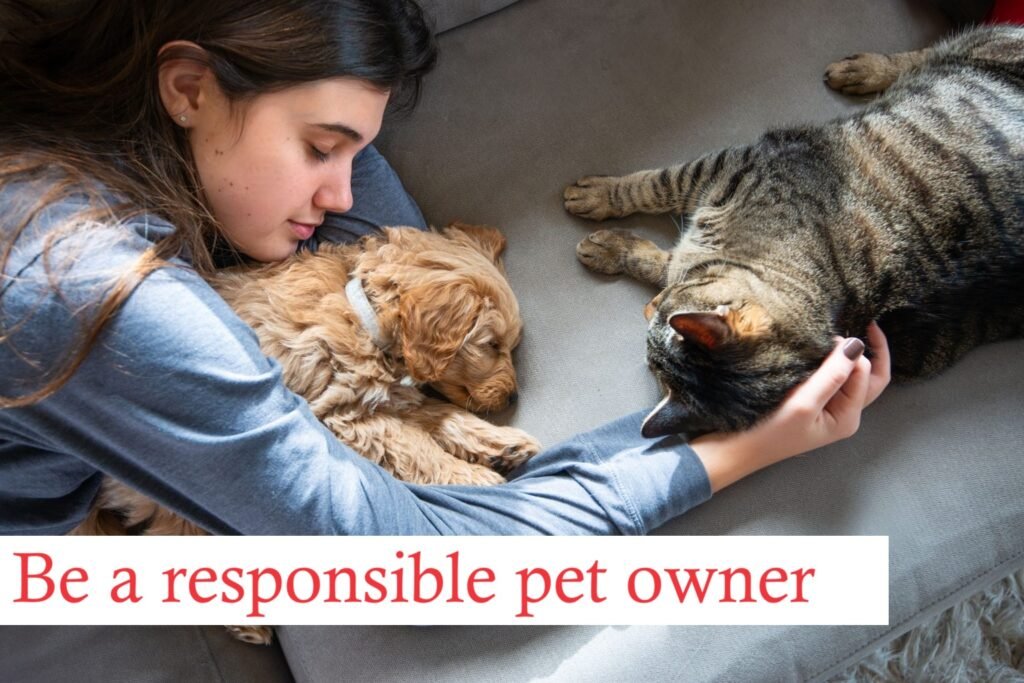Just like humans, pets need special care during pregnancy. As pet owners, it’s our job to give them the best care during this time. Taking care of a pregnant pet can be both rewarding and challenging. Good care is crucial for the health of the mother and her babies. This guide will help you every step of the way, so you’re ready to give your pregnant pet the best care possible.
1- Confirm the Pregnancy of Pet
Signs of Pregnancy
- Changes in Appetite: One of the first signs you might notice is a change in your pet’s eating habits. Your pet may start eating more than usual, or sometimes, especially in the early stages, they might eat less.
- Weight Gain and Abdominal Enlargement: As the pregnancy progresses, you’ll notice your pet gaining weight and their belly getting bigger. This is a clear indication of what they are expecting.
- Behavioral Changes: Pregnant pets often become more affectionate and may seek more attention from you. They might also start nesting, arranging their bedding, or looking for quiet, secluded spots to prepare for their babies.
Veterinary Confirmation
It is essential to take your pet to the vet to confirm the pregnancy and ensure everything is progressing normally. The vet can also check for any underlying health issues that need attention.
Diagnostic Methods:
- Ultrasound Test: Veterinarians commonly use ultrasound to confirm pregnancy. It can also help monitor the development of the fetuses.
- Blood Tests: Measuring hormone levels can confirm pregnancy.
- Physical Examination: The vet can feel the abdomen to check for signs of pregnancy.
2-Create a Comfortable Space for Babies to Arrive
Your pet will need a calm and quiet place to rest and prepare for her baby’s arrival. Choose a spot away from household traffic and noise. It should be warm and free from drafts.
Keep the following considerations in mind:
- Bedding and nesting materials: Provide soft blankets or towels for your pet to nest in. Ensure the materials are easily washable, as they require regular cleaning.
- Food and Water Bowls: Place these in an easily accessible area for your pet. Keep them clean and filled with fresh food and water at all times.
- Bedding Materials: To ensure your pet is comfortable, have extra bedding on hand. This will also make it simple to replace soiled bedding.
- Cleaning Supplies: Keep pet-safe disinfectants, towels, and disposable gloves ready for cleaning up any messes.
3- Provide Quality Food for Nutritional Needs
Make a dietary plan.
- Increased Caloric Intake: As your pet’s pregnancy progresses, her caloric needs will increase. Gradually increase the amount of food you give her. If she has trouble eating large meals, try feeding her smaller, more frequent meals.
- High-Quality, Nutrient-Dense Foods: Select pet food for pregnant or nursing animals. These foods are high in proteins and healthy fats, which are critical for your pet’s health and the development of her babies.
Avoid Oversupplement Dosage
Talk to your vet about whether your pet needs any supplements. They can recommend the right type and dosage to avoid oversupplementation.
Essential Vitamins and Minerals:
- Calcium is important for the development of a baby’s bones.
- Omega-3 Fatty Acids: Good for brain development.
4- Monitor Health and Wellness
Recognizing Health Issues with Warning Signs:
- Unusual Discharge or Bleeding: This could indicate a problem with the pregnancy.
- Lack of Appetite or Severe Lethargy: Contact the vet if your pet stops eating or seems unusually tired.
- Excessive Vomiting or Diarrhea: See a veterinarian immediately if this is a sign of illness.
- Immediate Actions to Take: Call your vet immediately if you notice any of these warning signs. Keep emergency contact numbers handy if you need to reach the vet quickly.
Visit Your Vet Regularly
- The vet will schedule check-ups to ensure the pregnancy is progressing normally and to address any issues that may arise.
- To check on the growth and development of the fetuses, the vet will use ultrasounds.
- This also helps to determine the number of babies your pet is expecting.
5- Arrange Regular Exercise and Activities to Do
Regular exercise helps maintain your pet’s muscle tone and overall health during pregnancy. It can also prevent excessive weight gain, which can lead to complications.
- Gentle walks on a leash and light playtime with favorite toys keep your pet active without overexerting her.
- Minimize loud noises and disruptions in your home. Create a quiet retreat area where your pet can rest undisturbed.
- Keep feeding and exercise schedules consistent. Avoid introducing new pets or making major home changes that could stress your pregnant pet.
6- Preparation for Delivery Time
Signs of Impending Labor
- Nesting Behavior: As labor approaches, your pet will likely become more restless and start nesting. She may dig or rearrange her bedding to find secluded spots.
- A significant drop in body temperature in dogs can indicate that labor is imminent. You can monitor this with a rectal thermometer.
What to Expect During Delivery
Stages of Labor:
- Stage 1: Your pet may be restless, panting, and nesting. This stage can last from a few hours to a day.
- Stage 2 is the active labor stage, during which contractions start, and the babies are born.
- Stage 3: This stage marks the expulsion of the placenta. It usually occurs shortly after each baby’s delivery.
When to Call the Vet: If labor is prolonged without progress, if your pet shows signs of distress, or if there is excessive bleeding, contact your vet immediately.
6- Post-Delivery Care
Immediate Care for the Mother
- Rest and Recovery: After giving birth, your pet will need a quiet, comfortable space to rest. Provide plenty of fresh water and nutritious food to help her recover.
- Monitoring for Complications: Keep a close watch on the mother for any infection or retained placenta indications. Monitor her temperature and behavior to ensure she is recovering well.
Caring for Newborns
- Ensuring Warmth and Feeding: Keep the area warm with heating pads or lamps, but ensure a cool area. Ensure all newborns are nursing properly. If they aren’t, you may need to consult your vet for advice on hand feeding.
- Monitoring Health and Growth: Weigh the newborns daily to ensure they gain weight. Poor appetite or lethargy may indicate illness.
Special Considerations for Different Pets
For Dogs
- Specific Nutritional Needs: Dogs need a high-protein diet to support lactation. To prevent dehydration, make sure she has increased water intake.
- Whelping Considerations: Prepare for the possibility of a large litter. Ensure the whelping area is accessible and safe for the mother and puppies.
For Cats
- Feline Pregnancy Nutrition: Cats need a high-calorie diet to meet their energy needs. Incorporating taurine-rich foods is critical for their heart and eye health.
- Kitten Care: Regularly check on kittens to ensure they are feeding and healthy. Provide a safe, warm space for the mother and kittens to rest.
For other animals (Rabbits, Guinea Pigs, etc.)
- Unique Needs: These pets have specialized diets and nesting materials. Handle them sparingly to reduce stress during pregnancy and after birth.
- Considerations for Nesting and Birthing: Provide ample nesting materials and monitor closely, but minimize disturbances to avoid stressing the mother.
Conclusion
Proper veterinary care, nutrition, and a safe, stress-free environment are essential for a healthy pregnancy and delivery. Always consult with a vet about specific concerns and follow their advice closely. Stay informed and prepared for each stage of pregnancy and delivery. Provide love and attention to ensure the mother’s and her offspring’s well-being.



